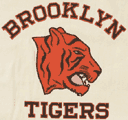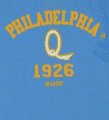
The Orange Tornadoes and Newark Tornadoes were two manifestations of a long-lived professional American football franchise that existed in some form from 1887 to 1941 and from 1958 to 1970, having played in the American Amateur Football Union from 1888 to 1895, the National Football League from 1929 to 1930, the American Association from 1936 to 1941, the Atlantic Coast Football League from 1963 to 1964 and 1970, and the Continental Football League from 1965 to 1969. The team was based for most of its history in Orange, New Jersey, with many of its later years in Newark. Its last five seasons of existence were as the Orlando Panthers, when the team was based in Orlando, Florida. The NFL franchise was sold back to the league in October 1930. The team had four head coaches in its two years in the NFL – Jack Depler in Orange, and Jack Fish, Al McGall and Andy Salata in Newark.

The Duluth Eskimos were a professional football team from Duluth, Minnesota in the National Football League (NFL). After spending most of their time as a traveling team, they withdrew from the league after the 1927 season.
The Cleveland Indians were a professional football team in the National Football League for the 1931 season.
The Staten Island Stapletons also known as the Staten Island Stapes were a professional American football team founded in 1915 that played in the National Football League from 1929 to 1932. The team was based in the Stapleton section of Staten Island. They played under the shortened nickname the "Stapes" the final two seasons. Jack Shapiro, who was a blocking back for the Stapletons, was the shortest player in NFL history.

The Brooklyn Dodgers were an American football team that played in the National Football League from 1930 to 1943, and in 1944 as the Brooklyn Tigers. The team played its home games at Ebbets Field of the baseball National League's team, the Brooklyn Dodgers. In 1945, because of financial difficulties and the increasing scarcity of major league–level players because of the war-time defense requirements at the height of World War II, the team was merged with the Boston Yanks and were known as the Yanks for that season.

George Stanley Halas Sr., nicknamed "Papa Bear" and "Mr. Everything", was an American professional football player, coach, and team owner. He was the founder and owner of the Chicago Bears of the National Football League (NFL), and served as his own head coach on four occasions. He was also lesser-known as a player for the New York Yankees of Major League Baseball (MLB).
The 1930 NFL season was the 11th regular season of the National Football League.

The Philadelphia Quakers were a professional American football team that competed in the first American Football League in 1926 and won the league's only championship.
The American Association (AA) was a professional American football minor league based in New York City. Founded in 1936 with teams in New York and New Jersey, the AA extended its reach to Providence, Rhode Island prior to the onset of World War II. After a four-year hiatus, the league was renamed the American Football League as it expanded to include teams in Ohio and Pennsylvania. In 1947, the Richmond Rebels of the Dixie League purchased the assets of the defunct AFL Long Island Indians and jumped leagues.
The Chicago Bulls were a professional American football team that competed in the first American Football League in 1926. Owned by Joey Sternaman, the Bulls also had AFL founders C. C. Pyle and Red Grange as shareholders. Joey Sternaman was also the coach and blocking back for the Bulls throughout their brief existence.
The 1930 Portsmouth Spartans season was the inaugural season for the Portsmouth Spartans in the National Football League (NFL), joining on July 12, 1930. Despite holding a 4–1–1 record going into Week 6, tied for 2nd in the league, the Spartans managed only 1 more win as they finished 5–6–3, seventh in the NFL.
Frank William Kirkleski was an American football player and educator. He played during the early years of the National Football League (NFL) for the Pottsville Maroons, Orange/Newark Tornadoes, and Brooklyn Dodgers. Kirkleski played college football at Lafayette College, in which he graduated from in 1927.
The 1930 Newark Tornadoes season was their second and final in the National Football League. The team failed to improve on their previous output of 3–5–4, winning only one game. Playing eight games in October and losing 6, they finished eleventh in the league.
Andrew J. Salata was a professional football player-coach with the Orange Tornadoes and later the Newark Tornadoes, of the National Football League. In 1930, the Tornadoes moved to Newark from Orange, New Jersey. The team then hired Salata and Jack Fish to serve as co-coaches. Neither man had ever coached in the NFL before. Under the two coaches the Tornadoes were 1-11, to finish last in the league.
Albert McGall was a professional football and track and field coach.
Newark Schools Stadium is the name of two stadiums that were both located on Bloomfield Avenue between Abington and Roseville Avenues in the Roseville section of Newark, New Jersey.
The Newark velodrome was a wooden bicycle track in the Vailsburg neighborhood of Newark, New Jersey, located at the northeast corner of the intersection of South Orange Avenue and Munn Avenue. It opened in 1911 and measured six laps to the mile, or 293 yards per lap. It replaced another 1/6-mile wooden velodrome that was located to the south, in the northwest corner of the current Vailsburg Park. That velodrome opened on May 10, 1908 and replaced a 1/4-mile wooden velodrome that had opened in 1897 on the same site.
Henry Marvin "Heinie" Benkert was a professional American football running back who starred collegiately at Rutgers University, where he won the unofficial collegiate scoring crown as a senior, and played for four non-consecutive seasons in the National Football League (NFL), for the New York Giants, the Pottsville Maroons and the Orange/Newark Tornadoes.
John P. Tomaini was an American professional football player who played in the National Football League (NFL) for the Orange Tornadoes in 1929, the Newark Tornadoes in 1930, and the Brooklyn Dodgers from 1930 to 1931. Tomaini played in a total of 35 career games while making 21 starts.
Michael Stramiello Jr. was an American football player, coach, and team owner. He played five seasons in the National Football League (NFL) from 1930 to 1934. He was also the coach and an owner of the Newark Tornadoes in 1937 and 1938.




